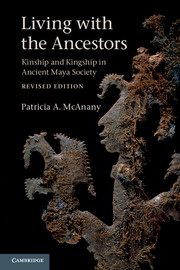Book contents
- Frontmatter
- Dedication
- Contents
- Figures and Table
- Preface
- Living with the Ancestors: Kinship and Kingship in Ancient Maya Society
- Introduction to the Revised Edition
- ONE A Point of Departure
- TWO Ancestor Veneration and Lineage Organization in the Maya Region
- THREE Creating a Genealogy of Place
- FOUR Lineage as a Crucible of Inequality
- FIVE Kin Groups and Divine Kingship in Lowland Maya Society
- SIX Ancestors and Archaeology of Place
- POSTSCRIPT The Future of the Ancestors and the Clash between Science and Human Rights
- Notes
- References Cited
- Index
POSTSCRIPT - The Future of the Ancestors and the Clash between Science and Human Rights
Published online by Cambridge University Press: 05 July 2014
- Frontmatter
- Dedication
- Contents
- Figures and Table
- Preface
- Living with the Ancestors: Kinship and Kingship in Ancient Maya Society
- Introduction to the Revised Edition
- ONE A Point of Departure
- TWO Ancestor Veneration and Lineage Organization in the Maya Region
- THREE Creating a Genealogy of Place
- FOUR Lineage as a Crucible of Inequality
- FIVE Kin Groups and Divine Kingship in Lowland Maya Society
- SIX Ancestors and Archaeology of Place
- POSTSCRIPT The Future of the Ancestors and the Clash between Science and Human Rights
- Notes
- References Cited
- Index
Summary
Just as the clash between kinship and kingship pervaded Maya society in the first millennium A.D., so the opposition between science and human rights will consume archaeological research in the third millennium A.D. This factional and ideological conflict between the perspective of the First Americans and archaeologists of the United States has already fundamentally changed the conduct of archaeological inquiry north of the Rio Grande (McGuire 1992). The conflict is focused on one issue: the future of the ancestors. At stake is the privileged right of primarily Anglo archaeologists to reach into the past and touch, examine, and remove ancestral remains and associated burial goods. This is the context in which our zeal to study the past collides with the rights of an ethnic faction to keep their past intact and buried. In many respects it is an unresolvable ideological clash, but it has no doubt been exacerbated by a long and painful history of asymmetrical power relationships between archaeological scientists and First Americans who are the generalized or specific descendants of the progenitors who created what we in the Americas call “the archaeological record.” It has been aggravated by the cavalier attitude of archaeologists toward burial remains and a general laziness toward communicating the nature and results of our inquiries to the general public—even less to those linked genealogically to the skeletal material upon which we base our studies. Finally, because few First Americans from north or south of the Rio Grande have been included in the process of archaeological research, the practice itself has taken on the unwelcome guise of "an Instrument of domination" playing much the same role as did the exclusive, elite-based literacy of the Classic Maya. When access to knowledge becomes circumscribed, it becomes wedded to power in a manner that is not only conducive to abuses but is a flashpoint for resistance and conflict.
- Type
- Chapter
- Information
- Living with the AncestorsKinship and Kingship in Ancient Maya Society, pp. 167 - 168Publisher: Cambridge University PressPrint publication year: 2014

